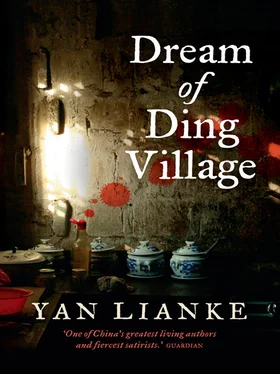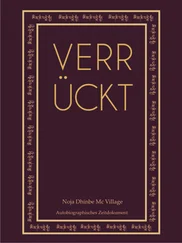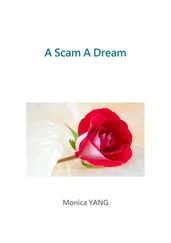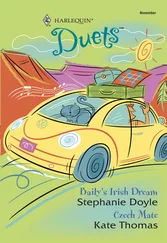The fighting stopped.
Lingling and Uncle stared at the broken bowl. Both knew that breaking a bowl of medicine was a bad omen. It meant that a person was going to die soon — so taking medicine was pointless. They stared at each other in silence. The room grew still, the atmosphere oppressive. They could feel themselves beginning to sweat, like buns in a bamboo steamer, or peas boiling in a pot. Both of them had grown thin, so very gaunt and thin. Lingling’s once-voluptuous bosom seemed to have collapsed. The breasts that Uncle had adored now hung from her chest like two sacks of withered flesh. Her moist and rosy skin, which had maintained its glow despite the many rashes and spots, had turned ashen, marred with discolouration like patches of rust.
Her eyes were sunken, the hollows as large as hen’s eggs. Her cheekbones jutted out like the poles of a funeral tent. Her person was so shrunken, so diminished, that she seemed hardly a person at all. Her dry, dull hair, which hadn’t been combed in days, lay on her pillowcase like a tangle of rust, a clump of wormwood that had sprouted from the pillow. As for Uncle, he still managed to put away as much food as ever, but Lord only knows where it went. His square face had become hatchet-like, his cheekbones sharp as knife-blades. His eyes held none of their former light: the pupils had shrunken, leaving too much white.
After breaking the bowl, he stared for a long time at the ceramic shards that littered the floor.
‘Lingling, when I said I wanted you to die first, I wasn’t being selfish. I was only thinking of what’s best for you. If you don’t believe me, I’ll kill myself right now.’
‘Kill yourself how?’
‘I’ll hang myself.’
‘Go ahead, then.’ Lingling sat up in bed and ran her fingers through her tangled hair. Her expression was calm and composed. ‘We’re both going to die soon, anyway. Go get some rope. When I see you stand on a stool and put your head in the noose, I’ll put my head in another noose and we’ll both kick the stools away at the same time. If we can’t live together, at least we can die together.’
Uncle stared at Lingling, unsure if she was serious.
‘Go get some rope,’ she repeated.
Uncle didn’t move.
‘Go on. I think there’s some under the bed.’
Backed into a corner, Uncle stared at Lingling for a long time before he bent down and began rummaging under the bed. He found the rope, fashioned two nooses, stood on a bench and hung them from the rafter above. When he had finished this task, he turned to look at Lingling. It was as if he were sizing her up, testing to see who was more courageous. It was a tender look, a teasing challenge. Uncle was surprised to find that Lingling — so gentle in life, so wild in bed — would be so steadfast in the face of death. After Uncle had secured the nooses, Lingling stood up calmly, washed her face, ran a comb through her hair and went out to lock the courtyard gate. When she returned, she stepped up on to the wooden stool and looked at Uncle.
‘If we die together,’ she declared, ‘it will prove that our love was not in vain. That we have no regrets.’
It was barely noon, and the sun hung in the eastern sky, its fiery rays streaming through the window and on to the bed. The quilt was neatly folded, the clothes in their cupboards, and the chairs and tables lined up against the walls. Everything they had moved from the threshing ground had been unpacked, and the room was in perfect order. Lingling had even laundered the curtain that hung from the door, washing it until it was sparkling clean. She had made this house her own, washing and scrubbing until every last trace of Song Tingting was gone. It was her house now. She had even removed Tingting’s mattress and replaced it with one that she and Uncle had slept on. Time and again, she had wiped down the boxes and trunks that Tingting had used, to rid them of the other woman’s smell. She had collected the bowls that Tingting had eaten from and taken them out to the coop to use for chicken feed. This was her and Uncle’s home now, and Lingling would die happier knowing that her house was in perfect order. She had even taken the shovels and hoes from behind the doors and stored them beneath the eaves of the courtyard. Lingling glanced around the four corners of the room and saw that everything was neat and tidy. Four square walls of a tomb. There was nothing left to unpack, nothing to tidy up, nothing left to do but die. Satisfied that the room was perfect, Lingling picked up a damp towel from the washstand and wiped her face. Then she stepped calmly on to the stool that Uncle had prepared for her, grasped the noose dangling from the rafters and turned to look at him.
At this point, there was no retreat. No moving forward and no turning back. The only choice was to stick one’s neck into the noose. Uncle took the circle of rope in both hands. Lingling did the same. She stared hard at Uncle, her gaze compelling him to put his head into the noose, so that she could follow suit. They were boxed into a corner now, at a dead end, and the only thing left to do was die. But at that moment, Uncle broke into a grin, a wicked, devil-may-care sort of grin, and said: ‘Still, I’ll take every day I can. If you want to die, you go ahead, but I want to go on living.’
With this, Uncle stepped off the stool, sat down on the bed and looked up at his wife, still clutching the noose in her hands.
‘Lingling, come down from there. If you do, I promise to be your servant, and wait on you hand and foot.’
Uncle stood up, took Lingling in his arms and lifted her down from the stool, then laid her gently on the bed and began removing her clothes. He gazed at her nude body, at the skin that had once been so fair but was now as dry and dull as withered grass after a long winter. Her face was pitiful to look at, wretched and gaunt, streaked with resentful tears.
‘Let’s do it,’ she begged. ‘Let’s just hang ourselves.’
‘No, let’s not. Each day we’re alive is better than being dead. And just think about how much we have to live for. We’ve got food to eat, a place to live, and we’ve got each other. If we’re hungry, we can fry up some cakes in the kitchen. If we’re thirsty, we can drink sugar-water. And if we get lonely, we can go out into the street and talk to people. I want you so much, Lingling. I want to stroke your face and kiss your lips. . the only thing I worry about is not being able to make love to you.’
But that is exactly what Uncle did, summon all of his strength and make love to his wife.
Uncle always was a rascal.
Afterwards, Lingling thought of something. ‘Liang, we didn’t even apply in person. Do you think your brother will come through with our official marriage licence?’
‘Don’t worry about that,’ Uncle answered smugly. ‘I hear they’re promoting him to head of the county AIDS task force. Getting a marriage licence should be a piece of cake.’
2
As it happened, my father did take care of everything. He handled two divorces and one marriage without Tingting, Lingling, Xiaoming or Uncle ever having to set foot in a government office. Uncle and his wife got a divorce, Lingling and her husband got a divorce, and Uncle and Lingling got two bright-red booklets embossed with an official seal from the civil-affairs department of the local district government.
When my father went to the house to give Uncle and Lingling their little red marriage certificates, most of the villagers were taking their midday nap. The sun was a bright poison hanging overhead, the air was filled with the buzzing of cicadas, and summer heat flowed through the streets like scalding water. The village was very, very still. Trampling the silence, my father left his house and walked through the village. He had some business to attend to in the county, but first he made a stop at my uncle’s house.
Читать дальше












